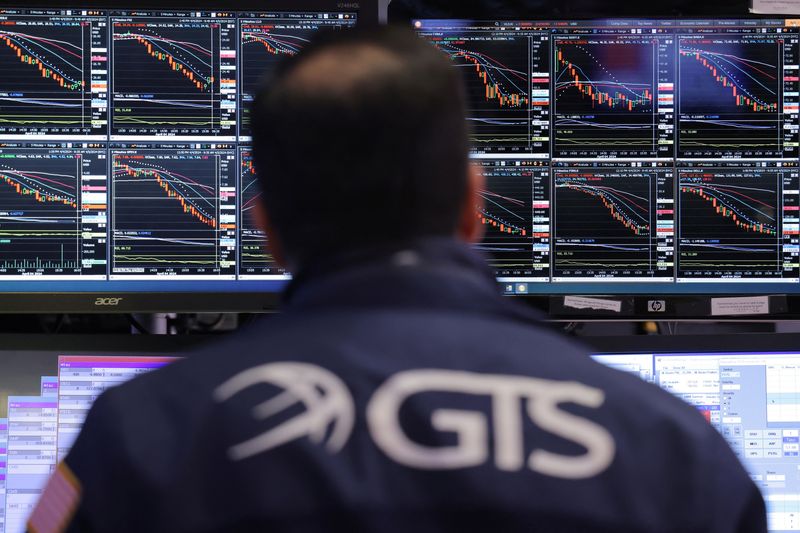A look at the day ahead in the US and global markets by Mike Dolan
A sharp drop in oil prices and a rare concerted warning from major economies against the dollar’s excessive strength have helped calm troubled markets just as Big Tech’s profits are starting to hit.
A volatile start to April appeared to spiral out of control this week as a combination of dire warnings from the Federal Reserve about persistent inflation and geopolitical stress sent the dollar soaring and triggered four straight daily losses for Wall St stocks.
But there was some disruption in Thursday’s session.
Despite tensions in the Middle East and sharp US economic data, prices turned around and are now down around 6.5% from Friday’s 2024 highs, to levels last seen before the attack of Israel at the Iranian Syrian Consulate on April 1.
Rising US crude inventories, poor economic data from China in March and a warning from the US to release more of its strategic crude reserve if necessary have kept oil in check.
And the pullback eases at least some of the inflation fears irritating bond markets, with Fed and U.S. Treasury yields falling at the same time. After briefly peaking at 5% this week, two-year Treasury yields have since fallen 10 basis points.
Similarly, the dollar has gone off the boil – partly after a warning shot from Japan, South Korea and the United States about potentially destabilizing currency moves in Asia.
As markets watched the G7 and G20 financial leaders in Washington at International Monetary Fund meetings, the rare three-part statement agreed to “closely consult” on currency markets, addressing concerns from Tokyo and Seoul’s recent sharp declines in their currency were acknowledged.
The dollar/yen pair fell slightly from a 34-year high, although it remains stuck above 154, and the South Korean won retreated from its weakest level in almost 18 months.
Alleviating market concerns that China could allow its yuan to weaken in a competitive regional export battle, China’s deputy central bank governor Zhu Hexin on Thursday separately reiterated Beijing’s “determination to keep the yuan exchange rate in principle to keep stable’.
The more stable bond and currency complex helped calm tense stock markets around the world as first-quarter corporate earnings flow in and attention shifts to major updates in the technology sector.
After Dutch chip equipment company ASML (AS:) lost more than 7% on Wednesday on its earnings miss, there was better news today from Taiwanese chip giant TSMC, which reported a beat riding the wave of demand linked to the artificial intelligence boom. intelligence.
Streaming company Netflix (NASDAQ:) kicks off the US Big Tech reporting season later on Thursday.
As a result, US stock futures are slightly firmer before the bell today, but the volatility gauge remains above 18 after four straight daily losses and cumulative losses of almost 5% from the record high seen late last month.
Financial stocks have had a rough week, with heavy earnings-related declines for Travelers (NYSE:) and US Bancorp on Wednesday.
In the central banking world, the Fed’s warnings this week about keeping interest rates tight for longer were not matched by European peers.
European Central Bank Vice President Luis de Guindos said the ECB has made it “crystal clear” that interest rates could be cut in June – even as policy decisions beyond that remain up in the air.
Elsewhere, a nearly 20% decline in one month took the stock to a six-week low below $60,000 on Wednesday – with this week’s ‘halving’ seen as largely already priced in.
Key agenda items that could provide direction to the US markets later on Thursday:
* US corporate earnings: Netflix, Blackstone (NYSE:), Comerica (NYSE:), PPG, Intuitive Surgical (NASDAQ:), DR Horton (NYSE:), March & McLennan, Snap-On, KeyCorp (NYSE:), Elevance Health , original parts
*Philadelphia Federal Reserve Business Survey in April, US existing home sales in March, weekly unemployment claims
* G20 finance ministers and central bankers meet at the International Monetary Fund’s spring meeting in Washington

* New York Federal Reserve President John Williams, Fed Governor Michelle Bowman and Atlanta Fed Chief Raphael Bostic speak; European Central Bank Vice President Luis de Guindos presents the ECB’s annual report to the European Parliament, ECB policymakers Isabel Schnabel Mario Centeno, Gediminas Šimkus and Boris Vujcic all speak; Bank of England policymaker Megan Greene speaks
* The U.S. Treasury Department sells inflation-protected notes with maturities of five years and notes with maturities of four weeks
(By Mike Dolan, Editing by Kirsten Donovan; mike.dolan@thomsonreuters.com)


